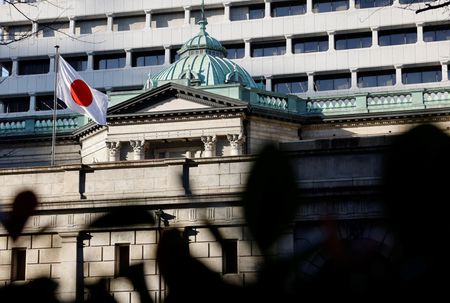By Herbert Lash
NEW YORK (Reuters) – Long-dated U.S. Treasury yields surged and global stock markets slid further on Friday as investors worried the Federal Reserve may not be able to curb inflation in the years ahead even as U.S.
data showed decelerating wage growth in April.
Labor Department data showed the unemployment rate fell last month to its pre-pandemic low of 3.5% as job growth moderated. Average hourly earnings rose 5.5% from a year ago, slightly slower than the previous month’s increase.
The data underscored challenges the Fed and other central banks face as they battle rising inflation with China’s lockdowns causing persistent supply chain disruptions and the war in Ukraine pressuring food prices.
The inflation outlook past the next two years is beginning to look cloudier for bonds, at least for bond traders, said Jim Vogel, interest rate strategist at FTN Financial.
“We have taken into account, not necessarily the inability of the Fed to fight inflation, but an inflation problem that for right now is beyond central banks to calm for the rest of the decade.
That’s pretty bleak,” Vogel said.
The yield on benchmark 10-year Treasury notes rose 5.3 basis points to 3.121%, a rate last seen in November 2018 after sharply rising from about 1.5% at the end of 2021.
The Fed hopes to slow inflation by tightening monetary policy.
Market volatility has increased on fears too much tightening could cause a recession.
Trade was volatile on Wall Street. The major indexes rose briefly into the green and the Nasdaq fell as much as 2.66%.
The Nasdaq and S&P 500 posted their fifth straight week of declines, and the Dow its sixth. It was the longest losing streak for the S&P 500 since mid-2011 and for the Nasdaq since late 2012.
The Dow Jones Industrial Average fell 0.3%, the S&P 500 lost 0.57% and the Nasdaq Composite dropped 1.4%.
“The market is focused on the Fed being behind the curve and that’s why the market is down,” said Keith Lerner, chief market strategist and co-chief investment officer at Truist Advisory Services.
Fed funds futures priced in a roughly 75% chance of a 75 basis-point interest rate hike at next month’s Fed policy meeting – even after Fed Chair Jerome Powell said Wednesday the U.S.
central bank was not considering such a move. [FEDWATCH]
The pan-European STOXX 600 index fell 1.91% as regional shares chalked up their worst week in two months. MSCI’s gauge of global equity performance shed 0.99% and emerging market stocks lost 2.57%.
Russell Price, chief economist at Ameriprise Financial, said the unemployment report showed the U.S.
labor market is solid.
“Over the last few months we have seen the month-over-month pace of average hourly earnings starting to decelerate somewhat,” he said. “That’s a positive indicator that this surge in hourly wages that we experienced may finally be easing.”
The dollar slipped against a basket of currencies after two volatile days as investors focused on how aggressive the Fed will be in hiking rates.
The dollar index hit a 20-year high overnight on safe haven demand, the day after a sharp stock selloff driven by rising U.S.
interest rates and as European currencies weakened on worries about growth in the region.
The dollar index rose 0.077%, with the euro up 0.06% to $1.0546. The yen weakened 0.31% at 130.56 per dollar.
The European Central Bank should raise its deposit rate back into positive territory this year, French central bank chief Francois Villeroy de Galhau said, indicating his support for at least three rate hikes in 2022.
The Bank of England raised rates by 25 basis points on Thursday as expected, but two policy makers expressed caution about future rate hikes.
Oil prices climbed for a third straight session, shrugging off concerns about global economic growth as impending European Union sanctions on Russian oil raised the prospect of tighter supply.
U.S.
crude futures rose $1.51 to settle at $109.77 a barrel and Brent settled up $1.49 at $112.39.
Gold rose on a weaker dollar but the prospect of aggressive rate hikes from the Fed led bullion to post its third straight weekly decline.
U.S.
gold futures settled 0.4% higher at $1,882.80 an ounce.
Bitcoin fell 1.76% to $35,891.06.
Germany’s 10-year government bond yield rose to 1.082%, its highest since 2014.
(Reporting by Herbert Lash, additional reporting by Alun John in Hong Kong and Sujata Rao in London; Editing by Chizu Nomiyama, Nick Zieminski and David Gregorio)











